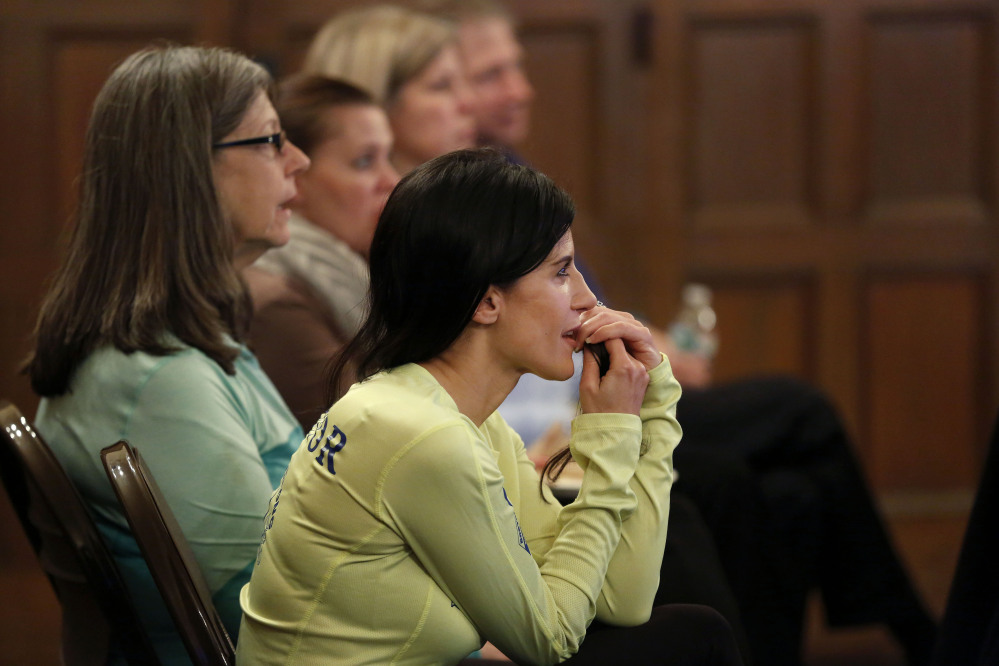BOSTON — Two years after the Boston Marathon bombings, few survivors appear to be taking advantage of free wellness programs meant to help with anxiety, stress, insomnia and other “invisible injuries” that can be just as devastating as losing a limb.
Just 42 survivors have pursued treatment for such problems through the One Fund Center, which was launched in September to aid the 240 victims and family members who received payouts from the main charity established in the wake of the blasts.
The Massachusetts Resiliency Center – which opened in October to help with behavioral and mental health problems suffered by the scores of people who may have been traumatized by the April 15, 2013, bombings or the ensuing manhunt – has served only a few hundred.
Although the centers have funding for at least two years, organizers fear it may be years before many survivors understand the emotional toll and decide to seek help.
Dr. Rebecca Brendel, a psychiatrist who is medical director for the One Fund Center, said she’s not surprised at the muted response so far.
“We always expected that demand for traditional psychiatric and mental health care would not be high,” she said. “This is a population that is incredibly resilient. This is not a fundamentally traumatized population. We certainly don’t want to identify this community as sick or mentally ill.”
Eric and Ann Whalley of Boston, who suffered severe physical injuries in the attacks, say they’ve so far chosen not to take advantage of counseling services.
“We’ve handled things our own way,” he said. “We’ve been impacted, but not with the sort of PTSD, severe anxiety and panic attacks that others have. We’ve done pretty well on that side of things.”
Dr. Kermit Crawford, a psychologist who heads the Resiliency Center, suggests demand for services – which include group therapy sessions on relaxation and stress management techniques – may grow over time.
“You have to remember: These are normal people dealing with an abnormal circumstance,” Crawford said.
Barbara Thorp, the One Fund Center’s program director, also expects enrollment to pick up soon. She said a number of survivors are waiting for the bombing’s second anniversary, this year’s marathon and bomber Dzhokhar Tsarnaev’s federal death penalty trial to run their course.
“Folks just want to get through the next few months,” Thorp said. “We will move at their pace and their level of readiness. Their unique path of recovery may not be linear nor move at a predetermined pace.”
Both the One Fund Center and Resiliency Center have been stepping up their outreach as the anniversaries approach.
They’ve also been sending staff to the Boston courthouse where Tsarnaev is being tried in order to offer counseling to victims’ families, survivors and those asked to testify.
The Resiliency Center runs on a roughly $2 million grant from the U.S. Department of Justice. The One Fund Center, which also offers treatment for eyesight and hearing problems, was created with about $1.5 million left after the main fundraising charity for bombing victims, One Fund Boston, began winding down operations late last year.
To be sure, many survivors and victims’ families are finding other ways to cope beyond formal wellness programs. Some are creating foundations and nonprofits to benefit others in similar situations, while others are training to run this year’s marathon.
Dr. Daniel Polley of the Massachusetts Eye and Ear Infirmary in Boston, which is helping survivors deal with hearing troubles, suggests a sort of “doctor’s fatigue” may also be a factor for those who have already undergone months of operations and physical therapy.
“Some of them just want to put this behind them, even if it’s bothering them,” he said. “They’ve had enough of doctors and hospitals.”
Indeed, each of the Whalleys has undergone roughly 20 operations. Eric Whalley, who lost sight in one eye, had an eardrum transplant and suffered serious leg damage, has opted to try an experimental treatment offered by the One Fund Center.
The weekslong treatment involves music and audio-visual games that he can do from home to help cope with a persistent ringing in his ears.
“It’d be nice to say we’ve made a full recovery. I don’t think we have,” Whalley said. “But we’re at a place where we’re comfortable. We just want to move on and get out there.”
Send questions/comments to the editors.



Success. Please wait for the page to reload. If the page does not reload within 5 seconds, please refresh the page.
Enter your email and password to access comments.
Hi, to comment on stories you must . This profile is in addition to your subscription and website login.
Already have a commenting profile? .
Invalid username/password.
Please check your email to confirm and complete your registration.
Only subscribers are eligible to post comments. Please subscribe or login first for digital access. Here’s why.
Use the form below to reset your password. When you've submitted your account email, we will send an email with a reset code.